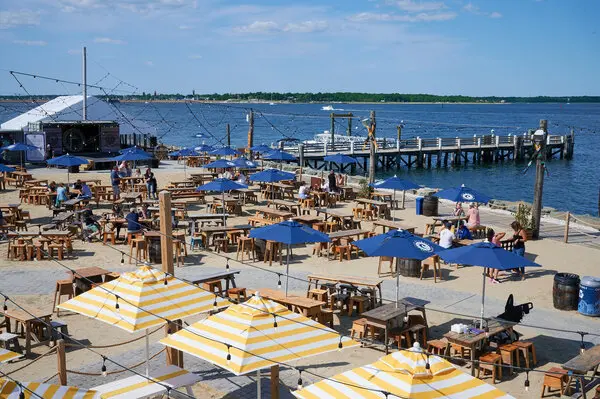Welcome aboard as we set sail into the deep waters of the whaling industry and its impact on our precious marine ecosystems. From the depths of history to present-day conservation efforts, join us on this journey to explore how whaling capital has shaped our relationship with the oceans. Let’s dive in!
History and Evolution of the Whaling Industry
The history of the whaling industry dates back centuries, with early civilizations hunting whales for their valuable resources. As demand grew, so did the scale of whaling operations, leading to overexploitation and depletion of whale populations.
In the 19th century, technological advancements like harpoon cannons and steam-powered ships revolutionized whaling practices, making it easier to hunt whales on a mass scale. This era saw a peak in commercial whaling as nations competed for profits from whale products such as oil and fat.
As global awareness increased about the impact of industrial whaling on marine ecosystems and endangered species, calls for conservation efforts began to gain momentum. The International Whaling Commission (IWC) was established in 1946 to regulate whaling activities and promote sustainable management of whale stocks.
Despite international regulations and bans on commercial whaling in many countries, some nations continue to engage in illegal or unregulated hunting activities. The evolution of the whaling industry reflects humanity’s changing attitudes towards nature and our responsibility to protect marine life for future generations.
The Negative Effects of Whaling on Marine Ecosystems
Whaling capital has had a devastating impact on marine ecosystems worldwide. The relentless pursuit of whales for profit has disrupted the delicate balance of these underwater environments, leading to cascading effects on various species and habitats.
The depletion of whale populations due to industrial whaling practices has caused significant disruptions in food chains. Whales play a crucial role in maintaining the oceans’ biodiversity, and their decline can have far-reaching consequences on other marine life.
Furthermore, whaling activities often result in bycatch – unintentional capture of non-targeted species such as dolphins, seals, and sea turtles. This collateral damage further contributes to the destabilization of marine ecosystems and threatens the survival of vulnerable species.
In addition to direct harm caused by hunting whales, noise pollution from whaling vessels disrupts communication among marine animals and interferes with their natural behaviours. This disturbance can have long-lasting adverse effects on ocean inhabitants’ overall health and well-being.
As awareness grows about the detrimental impacts of whaling on marine ecosystems, it becomes increasingly essential to advocate for sustainable alternatives that prioritize conservation and protection of our oceans’ fragile biodiversity.
The Impact on Endangered Species
The impact of whaling capital on endangered species is profound and far-reaching. For centuries, whales have been hunted to extinction for their valuable resources. Species like the blue, humpback, and fin whale have faced significant population declines due to relentless hunting practices.
Whales play a crucial role in maintaining the balance of marine ecosystems. As apex predators, they help regulate the populations of other aquatic species, contributing to the overall health of ocean ecosystems. The depletion of these majestic creatures can lead to cascading effects throughout the food chain.
The loss of biodiversity caused by whaling threatens individual species and weakens entire ecosystems’ resilience. As keystone species, whales are essential for ensuring ecosystem stability and functioning.
Conservation efforts are critical in protecting endangered whale species from further harm. Strict regulations on whaling practices and initiatives promoting sustainable alternatives are essential to safeguarding these magnificent creatures for future generations.
The Role of Government Regulations and Conservation Efforts
Government regulations and conservation efforts play a crucial role in protecting marine ecosystems from the negative impacts of whaling capital. Governments can ensure that whaling activities are carried out sustainably and ethically by implementing strict laws and monitoring practices.
These regulations help prevent overexploitation of whale populations and safeguard the delicate balance of marine ecosystems. Conservation efforts focus on raising awareness about preserving these majestic creatures for future generations.
Governments collaborate with environmental organizations and stakeholders to create designated sanctuaries where whales can thrive undisturbed. These initiatives aim to promote responsible tourism as an alternative to traditional whaling practices, encouraging economic growth without harming the environment.
Governments demonstrate their commitment to protecting endangered species and promoting ocean biodiversity by enforcing stringent guidelines and supporting conservation projects. We must continue to advocate for stronger regulations and sustainable solutions to mitigate the impact of whaling on our planet’s fragile ecosystem.
Sustainable Alternatives to Traditional Whaling Practices
As we seek a more sustainable future, exploring alternatives to traditional whaling practices is crucial. One promising solution gaining traction is whale-watching tourism. This eco-friendly activity allows people to witness these magnificent creatures in their natural habitat without causing harm.
Another alternative is supporting research and conservation efforts focused on protecting whales and their habitats. By investing in scientific studies and initiatives to preserve marine ecosystems, we can help ensure the long-term survival of these majestic animals.
Promoting responsible seafood choices is also crucial in reducing the demand for whale products. Encouraging consumers to choose sustainable seafood options helps decrease pressure on marine resources, including whales.
Educating communities about the importance of marine conservation and fostering respect for wildlife is vital in shifting attitudes towards more ethical practices. By raising awareness and promoting environmentally conscious behaviour, we can contribute to safeguarding our oceans for future generations.
Conclusion
As we reflect on the impact of whaling capital on the environment, it becomes clear that urgent action is needed to protect our marine ecosystems. The history and evolution of the whaling industry have left a devastating mark on endangered species and their habitats. However, with government regulations and conservation efforts in place, there is hope for a more sustainable future.
By shifting towards sustainable alternatives to traditional whaling practices, we can work towards preserving our oceans for future generations. We must prioritize environmental responsibility and make conscious choices to safeguard our marine biodiversity. Through collective actions and awareness, we can strive towards a healthier planet where whales and other aquatic species thrive harmoniously with nature. Let’s take steps today to ensure a brighter tomorrow for everyone sharing this planet with us.







